|
|
|
Sort Order |
|
|
|
Items / Page
|
|
|
|
|
|
|
| Srl | Item |
| 1 |
ID:
148988
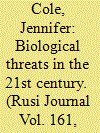

|
|
|
| 2 |
ID:
188282
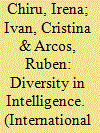

|
|
|
|
|
| Summary/Abstract |
With the advent of new technologies and the accelerated changes in the security arena, it has become apparent that intelligence organizations need to develop learning, self-reflective, and competitive working environments and communities of practice with a distinct set of values and norms that may go beyond the cultural values and practices of the twentieth century. One of the values that needs to be further explored and integrated is diversity. A look at the literature and policies in the field shows that in certain parts of the world, consistent steps have been made toward investigating the implications of diversity and inclusion as setting goals for reconceptualizing human resources and internal culture strategies. This introductory study aims to introduce readers to the current debates on diversity and inclusion, as well as offer a short glimpse at the question.
|
|
|
|
|
|
|
|
|
|
|
|
|
|
|
|
| 3 |
ID:
140294
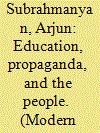

|
|
|
|
|
| Summary/Abstract |
On the morning of 24 June 1932 the ‘People's Party’, a small group of civil and military bureaucrats, toppled the Thai absolute monarchy and introduced constitutional democracy. This article discusses the establishment of democracy as an endeavour in ‘democratic paternalism,’ by which is meant the Party's attempt to establish a new moral and intellectual leadership that had as its main goal the creation of a depoliticized democratic citizenry. To implement their programme for democracy, the Party embarked on an ambitious plan to modernize education and explain popular sovereignty through countrywide lectures and radio programmes. The democratic paternalist effort had mixed results. State weakness limited the reach of the educational and propaganda campaigns, and further the ‘people’ in whose name the revolution was staged, constituted two different groups: a largely illiterate peasantry and a small, incipient new intelligentsia. Because of its limited capacity, the People's Party tasked the second group with assisting in democratic mentorship of the masses, but many in this second category of people had a broader conception of democracy than the Party's ‘top-down’ model and criticized the Party for its paternalist constraints on popular sovereignty. Democratic paternalism and frustration with the limits imposed on popular democracy are two central aspects of this period of history that have endured in Thai society.
|
|
|
|
|
|
|
|
|
|
|
|
|
|
|
|
| 4 |
ID:
149211
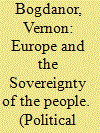

|
|
|
|
|
| Summary/Abstract |
In Britain, commentators on the constitution have an easy life, since we have no constitution. That is because our only constitutional principle is—or perhaps was, until we entered the European Community in 1973—the sovereignty of Parliament. That principle of course conflicts with the principle of the supremacy of European law.
|
|
|
|
|
|
|
|
|
|
|
|
|
|
|
|
| 5 |
ID:
112741
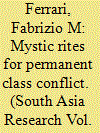

|
|
|
|
|
| Publication |
2012.
|
| Summary/Abstract |
Locating itself amidst current debates on post-modern analyses of mysticism, particularly academic debates on the Bauls of Bengal, this article discusses issues of cultural transformation as a result of gentrification and globalisation. It combines the author's ethnographic research and a methodology mainly derived from Italian Marxist critique (Antonio Gramsci, Ernesto de Martino, Antonio Negri and Paolo Virno). The article examines the reification of mysticism and the process of 'rehab', as imposed by Bengali bourgeoisie via the Tagorian archetype and the Western show business on the Bauls, to cleanse their image from inconvenient traits. Suggesting an interpretation of radical materialist mystics as 'multitude' and viewing professional Bauls as 'people', this research explores how the construction of a myth has ultimately penetrated contemporary society at all levels, including academic circles.
|
|
|
|
|
|
|
|
|
|
|
|
|
|
|
|
| 6 |
ID:
104933
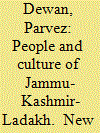

|
|
|
|
|
| Publication |
New Delhi, Manas Publications, 2011.
|
| Description |
387p.
|
| Standard Number |
9788170493433, hbk
|
|
|
|
|
|
|
|
|
|
|
|
Copies: C:1/I:0,R:0,Q:0
Circulation
| Accession# | Call# | Current Location | Status | Policy | Location |
| 056114 | 305.8546/DEW 056114 | Main | On Shelf | General | |
|
|
|
|
| 7 |
ID:
095827
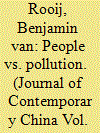

|
|
|
|
|
| Publication |
2010.
|
| Summary/Abstract |
Chinese pollution victims have increasingly started to resort to political and legal action to protect their interests. This paper analyzes such activism by studying how citizens identify the necessity to initiate action against pollution and by investigating the obstacles they meet when attempting to take action. The paper highlights the importance of state and intermediary institutions to aid citizens in understanding the seriousness of pollution and overcoming the obstacles they face. It shows, however, that often such aid is not available, and that state institutions when aligned with industrial interests restrict rather than support citizen action. When this occurs, citizen activism becomes an isolated affair, resulting in adversarial relations with state and industry, sometimes escalating to violence and repression of activists. The paper concludes that isolated activism forces a new look at concepts such as 'embeddedness' and 'rightful resistance' to capture citizen activism and contentious politics in China.
|
|
|
|
|
|
|
|
|
|
|
|
|
|
|
|
| 8 |
ID:
112396
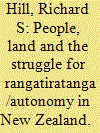

|
|
|
|
|
| Publication |
2012.
|
| Summary/Abstract |
This article interrogates indigeneity in the context of two New Zealand indigenous discourses, one of them land orientated and the other people orientated. It argues that the former has generally been emphasized over and above the latter, which it examines principally in terms of the struggle for the rangatiratanga (loosely translatable as autonomy) promised to Maori by the British Crown in the Treaty of Waitangi of 1840. People-based discourse is seen as key to the resilience of Maoridom and its powerful assertions of agency in recent decades. But to argue in this way is not to discount the land discourse, which in the holistic Maori worldview is conflated with the people discourse and rangatiratanga
|
|
|
|
|
|
|
|
|
|
|
|
|
|
|
|
| 9 |
ID:
099923
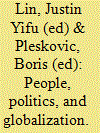

|
|
|
|
|
| Publication |
Washington, DC, World Bank, 2010.
|
| Description |
ix, 472p.
|
| Standard Number |
9780821377222
|
|
|
|
|
|
|
|
|
|
|
|
Copies: C:1/I:0,R:0,Q:0
Circulation
| Accession# | Call# | Current Location | Status | Policy | Location |
| 055454 | 320.01/LIN 055454 | Main | On Shelf | General | |
|
|
|
|
| 10 |
ID:
113548
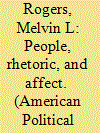

|
|
|
|
|
| Publication |
2012.
|
| Summary/Abstract |
In recent decades, the concept of "the people" has received sustained theoretical attention. Unfortunately, political theorists have said very little about its explicit or implicit use in thinking about the expansion of the American polity along racial lines. The purpose of this article in taking up this issue is twofold: first, to provide a substantive account of the meaning of "the people"-what I call its descriptive and aspirational dimensions-and second, to use that description as a framework for understanding the rhetorical character of W.E.B. Du Bois's classic work, The Souls of Black Folk, and its relationship to what one might call the cognitive-affective dimension of judgment. In doing so, I argue that as a work of political theory, Souls draws a connection between rhetoric, on the one hand, and emotional states such as sympathy and shame, on the other, to enlarge America's political and ethical imagination regarding the status of African-Americans.
|
|
|
|
|
|
|
|
|
|
|
|
|
|
|
|
| 11 |
ID:
142079
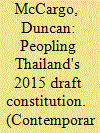

|
|
|
|
|
| Summary/Abstract |
In the wake of the 22 May 2014 military coup, Thailand began drafting its twentieth constitution since 1932. But the drafting process was dogged from the start by fundamental differences between the military junta and legal experts working on the new constitution. The military wanted to invoke “the people”, yet at the same time suppress their actual political participation. The constitution drafters wanted to create “active citizens” who were loyal to conservative, royalist notions about Thailand’s state and society, hoping they would be mobilized to police those notions, and so undermine those forces supporting a more open democratic politics. In the end, attempts to craft a charter shaped by legalistic ideas of moral citizenship and virtuous bureaucratic rule foundered in September 2015 when the draft constitution was voted down by the National Reform Council, a body whose members had been appointed by the junta itself. This article examines what was at stake in the struggles over the meanings of Thailand’s 2015 draft constitution, arguing that the junta deliberately sabotaged a constitution which embodied a view of the populace that was radically at variance with military preferences.
|
|
|
|
|
|
|
|
|
|
|
|
|
|
|
|
| 12 |
ID:
103727
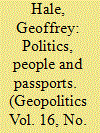

|
|
|
|
|
| Publication |
2011.
|
| Summary/Abstract |
This article examines the politics of border management in North America, particularly the United States' northern border with Canada, as a by-product of competing and overlapping domestic political discourses. It considers these perspectives in the context of US state-society relations and cross-border relations with Canada, focusing particularly on a case study on expanded requirements for personal identification for domestic and international travellers by Americans and their North American neighbours under the "Western Hemisphere Travel Initiative" (WHTI). It demonstrates the capacity of domestic and cross-border interest groups to mobilize political and bureaucratic support through American political processes to modify US domestic security rules, and the factors which contributed to these policy shifts.
|
|
|
|
|
|
|
|
|
|
|
|
|
|
|
|
| 13 |
ID:
102404
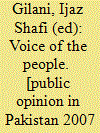

|
|
|
|
|
| Publication |
Karachi, Oxford University Press, 2010.
|
| Description |
xvii, 222p.
|
| Standard Number |
9780195475104
|
|
|
|
|
|
|
|
|
|
|
|
Copies: C:1/I:0,R:0,Q:0
Circulation
| Accession# | Call# | Current Location | Status | Policy | Location |
| 055861 | 320.95491/GIL 055861 | Main | On Shelf | General | |
|
|
|
|
| 14 |
ID:
103574
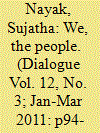

|
|
|
|
|
|
|
|